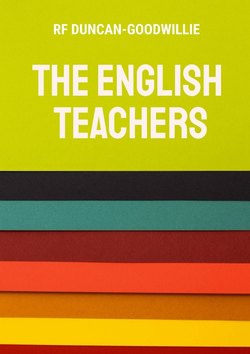Читать книгу The English Teachers - RF Duncan-Goodwillie - Страница 6
1
Origins and the Raison D’être
This work is for the following groups of people
Оглавление1) Teachers I often find one of the features of even general conversations with teachers is the constant quest for ideas. How can I improve my practice? How can this lesson be more interesting? How do I make more money!? Hopefully, this work will assist with answering these questions, but they are not the primary focus for teachers. I hope teachers will find common ground in terms of the issues they face and help each other (however indirectly) to find solutions. In particular, the matters of stress management seem particularly pertinent for teachers already in the profession. This book is also designed to be relevant to those who are considering teaching as a start or change to their career. I have found that several teachers have come into the profession with certain expectations which are then not met and they are left bitterly disappointed. I would encourage those prospective teachers to read the sections on what the students are like and the reality of teaching English. Hopefully, it will help them prepare for the rewards and challenges that lie ahead.
Many of the people in this book are teaching, or have taught, in the Russian context and so this book might best be called, “The English Teachers of Moscow”, but I believe the issues discussed here are largely universal and any teacher (or potential teacher) working in any context would benefit from reading about them. Still, I acknowledge that possible shortcoming and hope people will be willing to accept it. If you can’t, perhaps writing a book about teachers in your context is a route to consider. You would certainly find a willing audience in me.
2) Managers Management, like government, strikes many as something of a necessary evil and certainly few people go into management to be liked (and if you have then you really should have known better). As already mentioned, managers are busy people with little free time on their hands. I hope they will use some of that free time to look at the thoughts of those they manage and keep them in mind when they are planning their next steps. The chapter on teaching contexts and teaching in general will likely be the most useful in these cases.
3) Teacher Trainers I would not be exaggerating if I said all the teacher trainers I have ever met have been some of the smartest people I know. Of course, you can know everything in the world and still miss an important aspect: at the end of the day, we are training people. By offering some insight into teachers’ thoughts and feelings about training and professional development, perhaps trainers will be able to tailor their approaches more effectively.
4) Students A book about teachers that students can read?! It doesn’t make much sense on the surface, but students are curious people (in every sense of that adjective!). Why else would they take the time to learn a language and ask questions about it? Students do wonder what teachers do and what they think about. Perhaps by sharing some of this with them, teachers can become more relatable and students can become more engaged with the learning process. It is perhaps a distant dream in the minds of many, but if we do not try to encourage students to understand their teachers, we will never know. With this in mind, I have tried to make the conversations as clear as possible for those who do not speak English as a first language. Of course, if you cannot understand everything it’s possible to use a dictionary… or pay an English teacher to help you!
5) The Ever-Curious Public Everyone has an opinion on education. Everyone. My least favourite opinion is when people tell me (and it is always “telling”, never “saying”) how easy my job must be. It’s all, “Repeat after me, please!” and drinking vodka with the locals. My favourite opinion is when people assume I know everything about English. While I do know more than the average person, I wouldn’t claim a perfect knowledge (though it does provide a nice ego boost!).
I hope the insights shared by the teachers in this book will help enlighten the public about what we do and how we work. We might be teachers but we are still people and, as in any job, we face many issues and garner numerous rewards from our work. Perhaps, through deeper understanding, non-teachers will be able to appreciate our work more fully and appreciate us as people.
I have made the book as open in language as possible. There are a lot of abbreviations and acronyms in ELT – English Language Teaching – and I have added notes where I feel this would help. However, if anything is unclear, I would refer to the glossary at the start of the book and then to the TKT (Teacher Knowledge Test) glossary which was designed for a teaching exam but written in very clear language by Cambridge Assessment English. It is online and free. Also, Scott Thornbury’s A-Z of ELT which is online and free.
